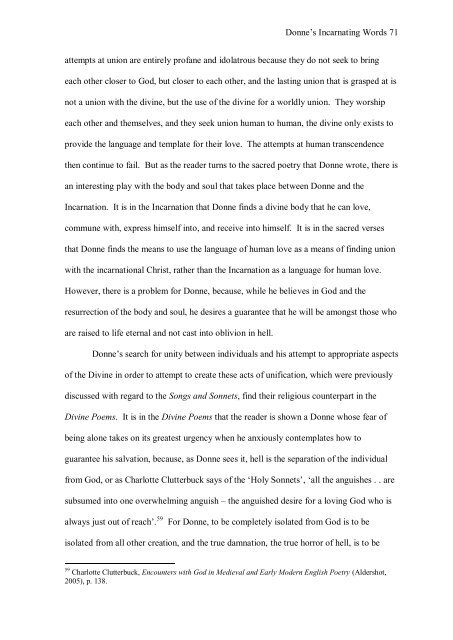Jesse Sharpe PhD thesis - Research@StAndrews:FullText ...
Jesse Sharpe PhD thesis - Research@StAndrews:FullText ...
Jesse Sharpe PhD thesis - Research@StAndrews:FullText ...
You also want an ePaper? Increase the reach of your titles
YUMPU automatically turns print PDFs into web optimized ePapers that Google loves.
Donne’s Incarnating Words 71<br />
attempts at union are entirely profane and idolatrous because they do not seek to bring<br />
each other closer to God, but closer to each other, and the lasting union that is grasped at is<br />
not a union with the divine, but the use of the divine for a worldly union. They worship<br />
each other and themselves, and they seek union human to human, the divine only exists to<br />
provide the language and template for their love. The attempts at human transcendence<br />
then continue to fail. But as the reader turns to the sacred poetry that Donne wrote, there is<br />
an interesting play with the body and soul that takes place between Donne and the<br />
Incarnation. It is in the Incarnation that Donne finds a divine body that he can love,<br />
commune with, express himself into, and receive into himself. It is in the sacred verses<br />
that Donne finds the means to use the language of human love as a means of finding union<br />
with the incarnational Christ, rather than the Incarnation as a language for human love.<br />
However, there is a problem for Donne, because, while he believes in God and the<br />
resurrection of the body and soul, he desires a guarantee that he will be amongst those who<br />
are raised to life eternal and not cast into oblivion in hell.<br />
Donne’s search for unity between individuals and his attempt to appropriate aspects<br />
of the Divine in order to attempt to create these acts of unification, which were previously<br />
discussed with regard to the Songs and Sonnets, find their religious counterpart in the<br />
Divine Poems. It is in the Divine Poems that the reader is shown a Donne whose fear of<br />
being alone takes on its greatest urgency when he anxiously contemplates how to<br />
guarantee his salvation, because, as Donne sees it, hell is the separation of the individual<br />
from God, or as Charlotte Clutterbuck says of the ‘Holy Sonnets’, ‘all the anguishes . . are<br />
subsumed into one overwhelming anguish – the anguished desire for a loving God who is<br />
always just out of reach’. 59<br />
For Donne, to be completely isolated from God is to be<br />
isolated from all other creation, and the true damnation, the true horror of hell, is to be<br />
59 Charlotte Clutterbuck, Encounters with God in Medieval and Early Modern English Poetry (Aldershot,<br />
2005), p. 138.
















